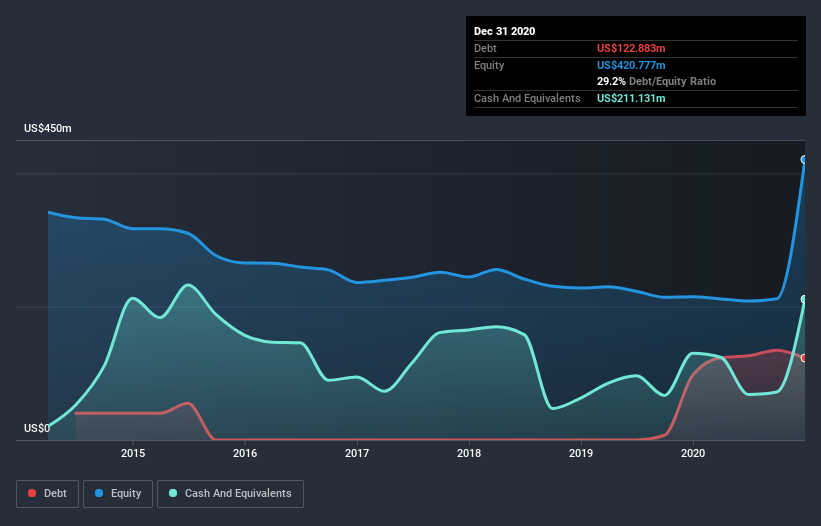- United States
- /
- Real Estate
- /
- OTCPK:NTPI.F
These 4 Measures Indicate That Nam Tai Property (NYSE:NTP) Is Using Debt Reasonably Well
Howard Marks put it nicely when he said that, rather than worrying about share price volatility, 'The possibility of permanent loss is the risk I worry about... and every practical investor I know worries about.' So it might be obvious that you need to consider debt, when you think about how risky any given stock is, because too much debt can sink a company. We can see that Nam Tai Property Inc. (NYSE:NTP) does use debt in its business. But the real question is whether this debt is making the company risky.
Why Does Debt Bring Risk?
Generally speaking, debt only becomes a real problem when a company can't easily pay it off, either by raising capital or with its own cash flow. In the worst case scenario, a company can go bankrupt if it cannot pay its creditors. While that is not too common, we often do see indebted companies permanently diluting shareholders because lenders force them to raise capital at a distressed price. Of course, the upside of debt is that it often represents cheap capital, especially when it replaces dilution in a company with the ability to reinvest at high rates of return. When we think about a company's use of debt, we first look at cash and debt together.
View our latest analysis for Nam Tai Property
What Is Nam Tai Property's Debt?
The image below, which you can click on for greater detail, shows that at December 2020 Nam Tai Property had debt of US$122.9m, up from US$97.4m in one year. However, its balance sheet shows it holds US$211.1m in cash, so it actually has US$88.2m net cash.

How Healthy Is Nam Tai Property's Balance Sheet?
The latest balance sheet data shows that Nam Tai Property had liabilities of US$147.2m due within a year, and liabilities of US$132.9m falling due after that. On the other hand, it had cash of US$211.1m and US$3.97m worth of receivables due within a year. So its liabilities outweigh the sum of its cash and (near-term) receivables by US$65.0m.
Given Nam Tai Property has a market capitalization of US$543.8m, it's hard to believe these liabilities pose much threat. However, we do think it is worth keeping an eye on its balance sheet strength, as it may change over time. Despite its noteworthy liabilities, Nam Tai Property boasts net cash, so it's fair to say it does not have a heavy debt load!
It was also good to see that despite losing money on the EBIT line last year, Nam Tai Property turned things around in the last 12 months, delivering and EBIT of US$21m. The balance sheet is clearly the area to focus on when you are analysing debt. But it is Nam Tai Property's earnings that will influence how the balance sheet holds up in the future. So when considering debt, it's definitely worth looking at the earnings trend. Click here for an interactive snapshot.
But our final consideration is also important, because a company cannot pay debt with paper profits; it needs cold hard cash. While Nam Tai Property has net cash on its balance sheet, it's still worth taking a look at its ability to convert earnings before interest and tax (EBIT) to free cash flow, to help us understand how quickly it is building (or eroding) that cash balance. During the last year, Nam Tai Property burned a lot of cash. While investors are no doubt expecting a reversal of that situation in due course, it clearly does mean its use of debt is more risky.
Summing up
While Nam Tai Property does have more liabilities than liquid assets, it also has net cash of US$88.2m. So we are not troubled with Nam Tai Property's debt use. When analysing debt levels, the balance sheet is the obvious place to start. But ultimately, every company can contain risks that exist outside of the balance sheet. We've identified 3 warning signs with Nam Tai Property (at least 1 which is a bit concerning) , and understanding them should be part of your investment process.
If, after all that, you're more interested in a fast growing company with a rock-solid balance sheet, then check out our list of net cash growth stocks without delay.
If you decide to trade Nam Tai Property, use the lowest-cost* platform that is rated #1 Overall by Barron’s, Interactive Brokers. Trade stocks, options, futures, forex, bonds and funds on 135 markets, all from a single integrated account. Promoted
Valuation is complex, but we're here to simplify it.
Discover if Nam Tai Property might be undervalued or overvalued with our detailed analysis, featuring fair value estimates, potential risks, dividends, insider trades, and its financial condition.
Access Free AnalysisThis article by Simply Wall St is general in nature. It does not constitute a recommendation to buy or sell any stock, and does not take account of your objectives, or your financial situation. We aim to bring you long-term focused analysis driven by fundamental data. Note that our analysis may not factor in the latest price-sensitive company announcements or qualitative material. Simply Wall St has no position in any stocks mentioned.
*Interactive Brokers Rated Lowest Cost Broker by StockBrokers.com Annual Online Review 2020
Have feedback on this article? Concerned about the content? Get in touch with us directly. Alternatively, email editorial-team (at) simplywallst.com.
About OTCPK:NTPI.F
Nam Tai Property
Through its subsidiaries, owns, develops, and operates technology parks in the People’s Republic of China.
Very low risk with weak fundamentals.
Market Insights
Community Narratives




